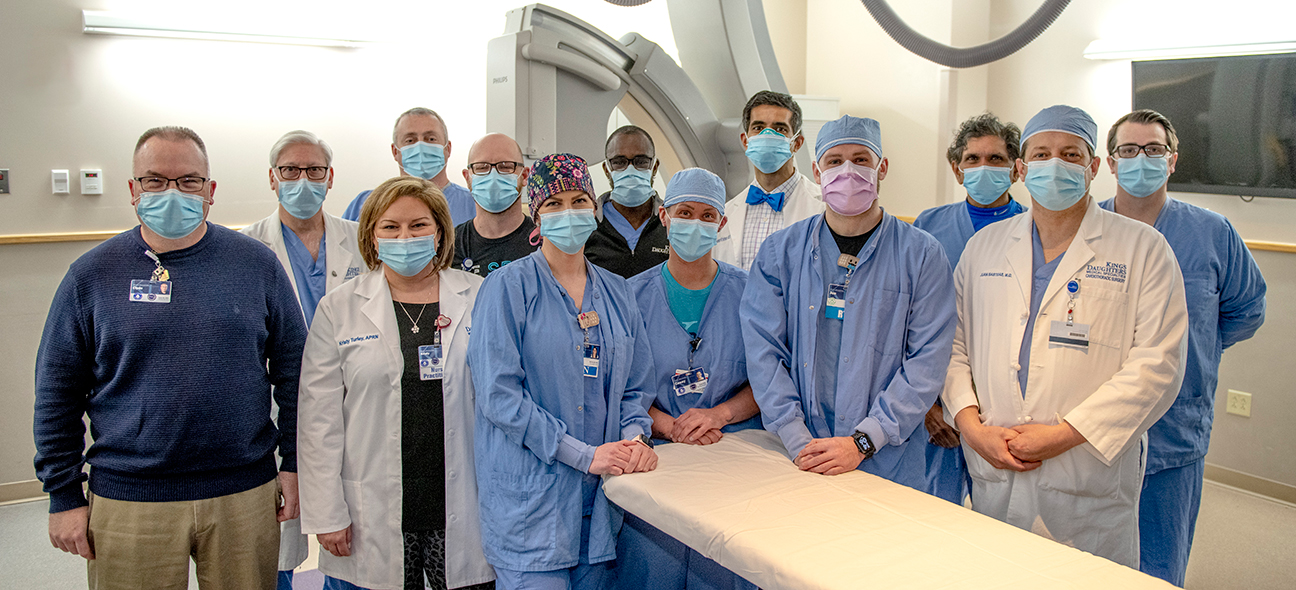King's Daughters recognized for excellence in transcatheter valve replacement
King’s Daughters Medical Center was recently recognized by the American College of Cardiology for its demonstrated expertise and commitment in treating patients receiving transcatheter valve repair and replacement procedures.
 The ACC's Transcatheter Valve Certification was awarded in late February based on evaluation of the organization’s ability to meet standards for multidisciplinary teams, formalized training, shared decision-making and registry performance.
The ACC's Transcatheter Valve Certification was awarded in late February based on evaluation of the organization’s ability to meet standards for multidisciplinary teams, formalized training, shared decision-making and registry performance.
King’s Daughters performed the region’s first minimally invasive transcatheter valve replacement (TAVR) in December 2013. The ACC’s transcatheter valve accreditation, which pairs national clinical databases and real-world outcomes, was implemented in 2019.
“King’s Daughters has demonstrated its commitment to providing the tri-state area with excellent heart care,” said Deepak L. Bhatt, MD, MPH, FACC, chair of the ACC Accreditation Management Board. “ACC Accreditation Services is proud to award King’s Daughters Medical Center with Transcatheter Valve Certification.”
“We are incredibly proud of our TAVR team and the dedication and skill they exhibit daily,” said Jamie Ward, senior director of clinical services at King’s Daughters. “This certification is evidence of the quality care we provide to our patients and communities and our commitment to the highest standards of care and safety.”
King’s Daughters TAVR team is comprised of cardiothoracic surgeons, cardiologists, vascular surgeons, interventional radiologists, cardiac anesthesiologists, cardiac imaging, nurses and radiologic technologists.
About Transcatheter Valve Replacement
Transcatheter valve replacement is a minimally invasive procedure performed in the cardiac catheterization lab. During the procedure, a specially designed balloon catheter is guided through the femoral (leg) artery to the aorta, and then to the aortic valve. Once in place, the physician deploys the balloon, opening up the valve. The balloon is then deflated and removed. A catheter carrying the new valve is guided through the arteries to the aortic valve. Once in place, the artificial valve is deployed and begins working immediately. Most patients are able to go home within a few days.
For more information about transcatheter valve replacement at King’s Daughters, please talk with your primary care provider or cardiologist, or call us at (606) 324-4745.
About the American College of Cardiology
The American College of Cardiology envisions a world where innovation and knowledge optimize cardiovascular care and outcomes. As the professional home for the entire cardiovascular care team, the mission of the College and its 54,000 members is to transform cardiovascular care and to improve heart health.
PHOTO:
The TAVR team includes, front row, from left: Clyde Clark, RN, quality management; Kristy Turley, APRN, structural heart program; Sheena Hartman, RN; Casey Callihan, RT; Jon Bailey, RT; and Juan Bastidas, M.D., cardiothoracic surgeon. Second row, from left: Eric Bronstein, M.D., cardiothoracic surgeon; Max Maynard, RT, clinical leader; Matt Stapleton, RN, clinical nurse leader; Ayodele Osasona, M.D., cardiothoracic surgeon; Sandeep Krishnan, M.D., interventional cardiologist; Sriharsha Velury, interventional cardiologist; and Adam Bazell, RN, clinical nurse leader.

